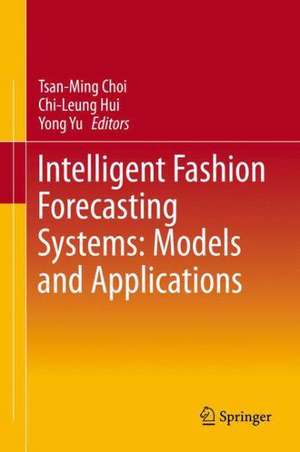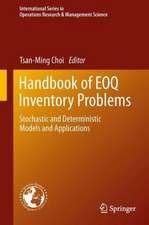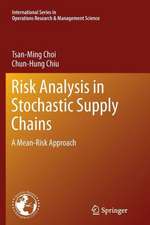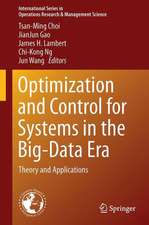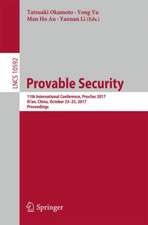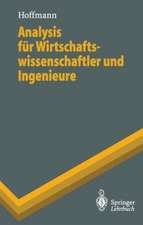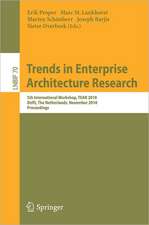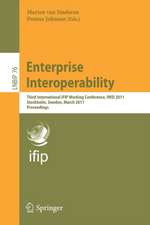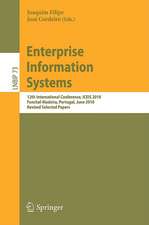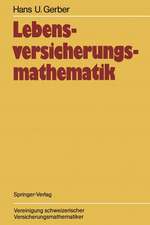Intelligent Fashion Forecasting Systems: Models and Applications
Editat de Tsan-Ming Choi, Chi-Leung Hui, Yong Yuen Limba Engleză Hardback – 16 dec 2013
| Toate formatele și edițiile | Preț | Express |
|---|---|---|
| Paperback (1) | 686.65 lei 6-8 săpt. | |
| Springer Berlin, Heidelberg – 27 aug 2016 | 686.65 lei 6-8 săpt. | |
| Hardback (1) | 640.06 lei 6-8 săpt. | |
| Springer Berlin, Heidelberg – 16 dec 2013 | 640.06 lei 6-8 săpt. |
Preț: 640.06 lei
Preț vechi: 753.01 lei
-15% Nou
Puncte Express: 960
Preț estimativ în valută:
122.49€ • 127.41$ • 101.12£
122.49€ • 127.41$ • 101.12£
Carte tipărită la comandă
Livrare economică 14-28 aprilie
Preluare comenzi: 021 569.72.76
Specificații
ISBN-13: 9783642398681
ISBN-10: 3642398685
Pagini: 200
Ilustrații: VIII, 194 p. 76 illus., 39 illus. in color.
Dimensiuni: 155 x 235 x 17 mm
Greutate: 0.41 kg
Ediția:2014
Editura: Springer Berlin, Heidelberg
Colecția Springer
Locul publicării:Berlin, Heidelberg, Germany
ISBN-10: 3642398685
Pagini: 200
Ilustrații: VIII, 194 p. 76 illus., 39 illus. in color.
Dimensiuni: 155 x 235 x 17 mm
Greutate: 0.41 kg
Ediția:2014
Editura: Springer Berlin, Heidelberg
Colecția Springer
Locul publicării:Berlin, Heidelberg, Germany
Public țintă
Professional/practitionerCuprins
Part I: Introduction, review and exploratory studies.- 1.1 Introduction: Intelligent Fashion Forecasting.- 1.2 Sales forecasting in Apparel and Fashion Industry: a review.- Collaborative Planning Forecasting Replenishment Schemes in Apparel Supply Chain Systems: Cases and Research Opportunities.- Part II: Theoretical modeling research.- 2.1 Measuring Forecasting Accuracy: Problems and Recommendations (by the example of SKU-level judgmental adjustments).- 2.2 Forecasting Demand for Fashion Goods: A Hierarchical Bayesian Approach.- Forecasting Fashion Store Reservations: Booking Horizon Forecasting with Dynamic Updating.- Part III: Intelligent fashion forecasting: applications and analysis.- 3.1 Fuzzy Forecast Combining for Apparel Demand Forecasting.- 3.2 Intelligent Fashion Colour Trend Forecasting Schemes: A Comparative Study.- 3.3 Neural Networks Based for Romanian Clothing Sector.
Notă biografică
Tsan-Ming Choi (PhD) is currently an associate professor in fashion business at The Hong Kong Polytechnic University. Over the past few years, he has actively participated in a variety of research projects in operations management and information systems. His papers have appeared in leading business and engineering journals such as IEEE Transactions on Automatic Control, Production and Operations Management, Automatica, Annals of Operations Research, European Journal of Operational Research, Decision Support Systems, Service Science (INFORMS Journal), IEEE Transactions on Systems, Man, and Cybernetics (all parts), and various other IEEE Transactions. He has authored/edited ten research handbooks and guest-edited twelve special issues in academic journals. He is currently an area editor/associate editor/guest editor of the Annals of Operations Research, Decision Sciences, Decision Support Systems, European Management Journal, IEEE Transactions on Systems, Man, and Cybernetics – Systems, Information Sciences, Production and Operations Management, and many other operations management / information systems journals.
Chi-Leung Hui gained an MSc in technological economics from the University of Stirling, UK in 1988, an MSc in information systems from the Hong Kong Polytechnic in 1992, an MSc(Eng.) in computers in manufacturing from the University of Hong Kong in 1995, a PhD from The Hong Kong Polytechnic University in 1999, a LLB (Hons) from the University of Wolverhampton, UK in 2004, a LLM degree in information technology and intellectual property law from the University of Hong Kong in 2008, and a diploma in marketing from the Chartered Institute of Marketing, UK, in 1988 and the Certified Diploma in finance and accounting from The Chartered Association of Certified Accountants, UK, in 1991. He is a chartered engineer and is a chartered member of both the British Computer Society and the Chartered Institute of Marketing. He has published over 50refereed papers in journals such as Computers in Industry, IEEE Transactions on Engineering Management and IEEE Transactions on Systems, Man and Cybernetics – Parts A and C, and international conferences. Dr Hui is an associate professor at the Hong Kong Polytechnic University.
Yong Yu is currently a postdoctoral research associate at the Hong Kong Polytechnic University. He received his PhD from the Hong Kong Polytechnic University and he has published extensively in journals such as IEEE Transactions on Systems, Man, and Cybernetics, Decision Support Systems, Expert Systems with Applications, and International Journal of Production Economics.
Chi-Leung Hui gained an MSc in technological economics from the University of Stirling, UK in 1988, an MSc in information systems from the Hong Kong Polytechnic in 1992, an MSc(Eng.) in computers in manufacturing from the University of Hong Kong in 1995, a PhD from The Hong Kong Polytechnic University in 1999, a LLB (Hons) from the University of Wolverhampton, UK in 2004, a LLM degree in information technology and intellectual property law from the University of Hong Kong in 2008, and a diploma in marketing from the Chartered Institute of Marketing, UK, in 1988 and the Certified Diploma in finance and accounting from The Chartered Association of Certified Accountants, UK, in 1991. He is a chartered engineer and is a chartered member of both the British Computer Society and the Chartered Institute of Marketing. He has published over 50refereed papers in journals such as Computers in Industry, IEEE Transactions on Engineering Management and IEEE Transactions on Systems, Man and Cybernetics – Parts A and C, and international conferences. Dr Hui is an associate professor at the Hong Kong Polytechnic University.
Yong Yu is currently a postdoctoral research associate at the Hong Kong Polytechnic University. He received his PhD from the Hong Kong Polytechnic University and he has published extensively in journals such as IEEE Transactions on Systems, Man, and Cybernetics, Decision Support Systems, Expert Systems with Applications, and International Journal of Production Economics.
Textul de pe ultima copertă
Forecasting is a crucial function for companies in the fashion industry, but for many real-life forecasting applications, the data patterns are notorious for being highly volatile and it is very difficult, if not impossible, to analytically learn about the underlying patterns. As a result, many traditional methods (such as pure statistical models) will fail to make a sound prediction. Over the past decade, advances in artificial intelligence and computing technologies have provided an alternative way of generating precise and accurate forecasting results for fashion businesses. Despite being an important and timely topic, there is currently an absence of a comprehensive reference source that provides up-to-date theoretical and applied research findings on the subject of intelligent fashion forecasting systems. This three-part handbook fulfills this need and covers materials ranging from introductory studies and technical reviews, theoretical modeling research, to intelligent fashion forecasting applications and analysis. This book is suitable for academic researchers, graduate students, senior undergraduate students and practitioners who are interested in the latest research on fashion forecasting.
Caracteristici
The first edited volume on intelligent fashion forecasting systems Providing the state of the arts of knowledge, with both theories and applications Supplementing the literature on fashion forecasting which used to be qualitative only Includes supplementary material: sn.pub/extras
